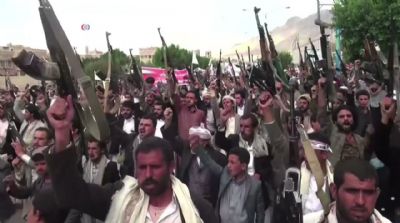Share
What's New
Resources updated Monday, March 29, 2021
March 29, 2021

Yemen's millennia-old Jewish population has come down to only four elderly men after the last few Jewish families remaining were expelled this week by the Iran-backed Houthi rebels, the Saudi newspaper Asharq Al-Awsat reports.
According to the report, one expelled family includes 13 men and women who agreed to leave Yemen if the Houthis freed a Jew who had been in prison for some six years.
The Saudi newspaper reported that the Houthis have made it a goal to wipe out the Yemenite Jewish community entirely. Until recently, the Jewish families resisted pressure to leave. However, when the relatives of the Jewish prisoner, Levy Salam, visited him in prison, the Houthi intelligence services offered to free him if the family would leave the country.
Salam was arrested for publishing an old version of the Torah.
One of the Jews who recently left told Asharq Al-Awsat that "Our choice was between remaining a target for harassment and them not letting Levy out of prison, or leaving, and him being set free."
"Therefore, we were forced to leave. History will document us as the last Yemenite Jews who clung to their home until the last moment. We refused much temptation in other times, but now we must leave," the man said.
Recently, another group of Jewish families left Yemen and found a home in the United Arab Emirates. The latest refugees are looking for a country to take them in, as they do not want to make aliyah.

On a day when Myanmar's commander in chief vowed in a speech "to protect people from all dangers," soldiers and police he controls gunned down dozens of men, women and children across the country, continuing a campaign to suppress widespread opposition to last month's military coup.
Demonstrations began a week after the Feb. 1 takeover, which abruptly ended Myanmar's decadelong shift toward democracy. They have continued every day since as protesters demand that elected government be restored. A civil disobedience movement has brought large parts of the economy to a standstill, with civil servants, factory workers, shopkeepers, bank staff and others refusing to go to work in an effort to push the military to give up power.
Soldiers have responded by shooting citizens in the streets. The U.N.'s Human Rights office said Saturday it had received reports of scores of people killed and hundreds injured across 40 locations in the country. A representative for the Assistance Association for Political Prisoners, a nonprofit that monitors arrests and fatalities, said at least 91 people had been killed and that the group was working to confirm the full death toll.
Before Saturday, armed forces and police had slain 328 people, according to the group. Images emerge daily of bloodied bodies with gunshot wounds and family members cradling the corpses of their loved ones.
Saturday began with a military parade in the capital Naypyitaw to mark the country's Armed Forces Day, an annual holiday celebrating the Tatmadaw, as Myanmar's armed forces are known. The ceremony was attended by Russia's Deputy Defense Minister Alexander Fomin in a show of Moscow's support for the generals, who face sanctions from the U.S. and other Western democracies. Myanmar's military is counting on Russia and China to block firm action against it at the U.N. Security Council, of which the two powers are permanent members.
Shots were fired at the U.S.'s cultural center in Yangon, Myanmar's largest city, on Saturday. No one was injured and the incident was being investigated, the U.S. Embassy said on its Twitter account. "On Myanmar's Armed Forces Day, security forces are murdering unarmed civilians, including children, the very people they swore to protect," U.S. Ambassador Thomas L. Vajda said.
"This bloodshed is horrifying," he said.
Saturday's violence comes days after the U.S. took what it called its "most significant action to date to impose costs on the military regime." Washington on Thursday sanctioned the two largest military-owned companies in Myanmar, which have interests across banking, mining, tourism, tobacco, logistics, construction and other sectors, adding to earlier sanctions against military officials. The steps against Myanma Economic Holdings Public Company Ltd., or MEHL, and Myanmar Economic Corporation Ltd. were intended to target those who led the coup and the military's economic interests, Secretary of State Antony Blinken said.
The U.K. also sanctioned MEHL in coordination with Washington. Earlier in the week, the European Union announced travel bans and asset freezes against a number of Myanmar military officials.
Russia's support for the generals drew criticism from protesters, who have called on the international community to pressure the army to restore democracy. On Friday in Myanmar, Mr. Fomin said Moscow was grateful for the countries' longstanding ties, and TV footage showed him and commander-in-chief Min Aung Hlaing sitting side by side in a large gold-trimmed hall.
"Myanmar is a trustworthy Russian ally and strategic partner in the Southeast Asian region," Russia's Zvezda TV, run by the Defense Ministry, quoted Mr. Fomin as saying.
Russia has maintained defense ties with both the country's civilian and military governments, and since 2001 has supplied approximately 30 MiG-29 warplanes and Mi-17 and Mi-24 helicopters. In 2018 Russia agreed to sell Myanmar six Su-30 warplanes. Defense Minister Sergei Shoigu visited Myanmar in January, before the coup, when he signed a contract with the country's defense ministry to supply the armed forces with Pantsir-S1 air-defense systems and Orlan-10E drones.
Dozens Shot Dead in Myanmar as Military Continues Ruthless Campaign Against Civilians Document
